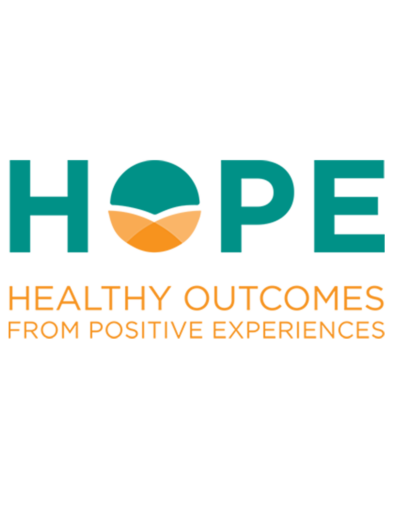HOPE (Healthy Outcomes from Positive Experiences) National Resource Center at Tufts Medical Center
HOPE (Healthy Outcomes from Positive Experiences) Framework Performance Measurement & Evaluation
Summary
HOPE (Healthy Outcomes from Positive Experiences) is a framework grounded in public health and early childhood development that helps communities and systems of care ensure more positive experiences for children and more support for their families. The Four Building Blocks of HOPE are the foundation for healthy childhood development.
The HOPE National Resource Center, led by Dr. Robert Sege, is based out of Tufts Medical Center in Boston. The National Resource Center works with health care practitioners, social service providers, and community-based organizations across the U.S. to implement the HOPE framework. Members of the HOPE Innovation Network (HIN) identify, pilot, and disseminate practices that advance the use of the HOPE framework in their existing programs.
Dr. Sege and Dr. Dina Burstein contacted Root Cause to help them understand how adoption of the HOPE framework leads to practice change among providers – and how this impacts families’ service experiences and their children’s health outcomes.
Goals & Results
In Year 1, (September 2021-August 2022), Root Cause and HOPE will recruit six or more providers to participate in the second cohort of the HOPE Innovation Network (HIN2).
- Through HIN2, we will learn how providers change as a result of adopting the HOPE framework and how their practices change as a result of HOPE’s Technical Assistance – measured through a self-assessment, periodic surveys, and focus groups/interviews.
- To better understand the impact on families and children, we plan to design and implement family surveys to understand change over time.
- At the end of Year 1, we will use our learnings to develop benchmarks and milestones for a HOPE certification pilot.
- We will also collect and analyze qualitative and quantitative data from HIN2 to produce a Year 1 summary report of findings.
In Year 2, (September 2022 – August 2023), Root Cause and the National HOPE Resource Center will:
- Design and implement the pilot for HOPE certification
- Track HOPE implementation and sustainability with HIN2 participants, and
- Develop a final report of findings and results from Year 2.
About the Partner

HOPE (Healthy Outcomes from Positive Experiences) National Resource Center at Tufts Medical Center
Positive experiences can ease toxic stress and help children and youth grow into more resilient, healthier adults. HOPE identifies ways that our communities and systems of care can better ensure that all children have more positive experiences and that all families have support to nurture and celebrate their strengths.
The Four Building Blocks of HOPE are composed of key positive childhood experiences (PCEs). The sources of those experiences and opportunities are the foundation for healthy childhood development.
With Us

